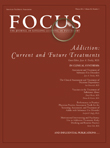Assessment and Treatment of Substance Use Disorders
Abstract
This is an overview of practices in addiction psychiatry. In particular, it refers to problems inherent in diagnosing and treating patients with alcohol and other substance use disorders. A proper assessment of substance use has the potential to decrease morbidity and mortality in those who are dependent on substances, and in those whose misuse leads to unsafe health and social practices. This article presents suggestions for working with patients who erect barriers to discussions about their substance use. There are tools clinicians can integrate into their practices that may simplify these discussions. New interventions have joined time-tested drug and alcohol treatments, in part as an outgrowth of the scientific understanding of addictions.



